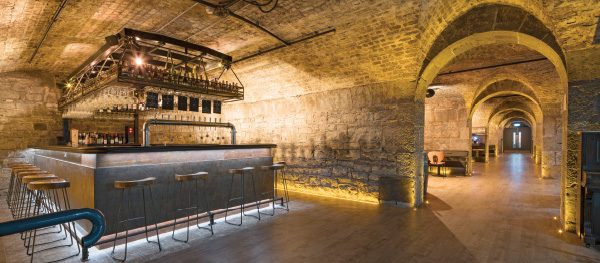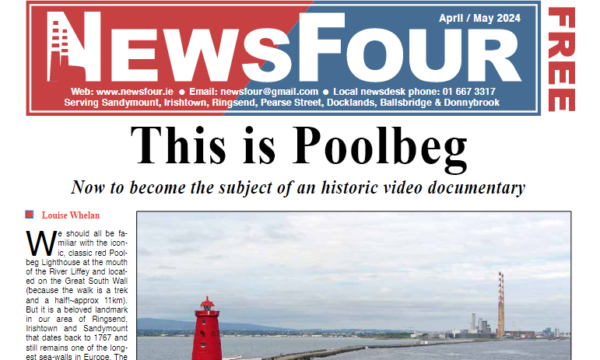
New microbrewery bar at CHQ.
It seems, at nearly every festival nowadays, whether it’s about flowers, music or dogs, that a craft beer showcase is included as standard.
However, when it comes to focusing purely on the booming Irish brewing and distilling industry, the RDS Craft Beer festival is the place for purists to go.
Between the 8th to 10th of September at the RDS, brewers were given the chance to showcase their beers and the public got a chance to meet the craftspeople behind these foamed flavours.
Although, what is surprising, when you meet some of the head craft brewers is that many of them are from abroad.When Killarney Brewing’s head brewer, who was from Oregon, left the company earlier this year, co-founder Tim O’Donoghue told NewsFour that they advertised for three months for his replacement but to no avail, and they had to advertise internationally, eventually recruiting a brewer from New York.
A similar situation occurred with Priory Brewing, when setting up. Priory Brewing is Ireland’s first social enterprise brewery and is based in Tallaght. After weeks of the advert having been placed on Beoir.org had passed, the only applicant to apply and who ended up being successful in his application, had just moved to Tallaght from Poland.
Looking back, Ireland had a large amount of microbreweries many moons ago but surveying these, the majority have been bought out by the giants of the industry and the trade itself no longer hangs on the family tree.
However, the industry is looking to the future with Ireland’s first degree course in brewing and distilling based out of Carlow IT. The course, which is in its first year and takes four years to complete, has filled its eighteen places this year.
NewsFour spoke with the programme’s Director Dr. David Ryan on how well prepared the students and the industry will be when they graduate. “The industry expects over 100 breweries to be in place by 2025 and right now the number is at between 80 and 90, so there is no point graduating more brewers than is actually needed and so this year we have taken in eighteen and next year the same,” said Ryan. The course which is facilitated by local breweries, O’Hara’s, Costellos and Walshes, is structured to give the students experience in a brewery or distillery in their third year with the task to come back for the fourth year with an industry problem for them to solve through lab work and research.
Recently, Dublin Institute of Technology (DIT) have also launched a two-year course in brewing and distilling at their new Grangegorman campus.
The Carlow Brewing Company (CBC) who produce the O’Hara’s range are intrinsically involved with the advisory board of the Carlow degree course and are also founders and co-organizers of the RDS festival.
They have had an adventurous year, to say the least. In April, they took in an investment for 32% of their business to Hijos de Rivera, the family-owned beer producer and distributor based in Galicia, Spain. This will see a partnership between the two with the O’Hara’s products set to benefit from potential sales to international markets, which include South America, Russia, China and Australia.
The Carlow Brewing company also opened a new microbrewery, bar and restaurant called Urban Brewing in the CHQ building at Georges Dock. The microbrewery boasts a mezzanine level for the fermenters that hold the beer, made exclusively, for the establishment. These feed the product down to the taps, a ‘taps and tapas’ area below. Underneath this bar sits the vaults. The vaults, which had not been used in 100 years, and were once used as a storehouse for wine and tobacco, have been converted into a restaurant and bar.
NewsFour spoke with CBD’s Director Seamus O’Hara, on the venture and the idea behind it, “I was kind of fascinated by the docklands and I’m surprised why it hasn’t taken off more yet, and hopefully we are another part of the jigsaw to help it take off. It’s the natural things here, the river, the history, the buildings here, the famine memorial.”
The Dublin Docklands Development Authority originally spent €45m on the CHQ building, but in 2013 former Coca-Cola boss Neville Isdell bought it for €10m and advertised this spot for let, and according to Seamus, the Urban Brewing microbrewery for Dublin city has been in the works since then.
The Carlow Brewing Company have been in business for over 20 years, which explains how and why they would venture to such a prime location, but with newer brewing companies like the Irishtown Brewing Company (IBC), who are hoping to set up a brewery in the town of their brewery’s namesake, it’s a little more difficult. NewsFour met with IBC director Director Joey Shore at their stand at the RDS festival to catch up with the closest thing D4 has to a brewery. ”We are trying to get a site for a brewery at the moment. Irishtown is not looking suitable… you can’t buy a one-bedroom house for less than four hundred grand,” said Shore.
Despite the brewery still renting out fermenters in the Hope Brewery in Kilbarrack, they are moving at a fast pace. The last time NewsFour met with the Irishtown Brewery in the April issue, they were in 55 bars and currently they are in 240.
An especially profitable aspect of the industry lies in tourism. A clear example of this is Mia Tobin, the recipient of the Inner City Employment (ICE) female entrepreneur of the year award. Mia opened up breweryhops.com in 2014, which facilitates trips around breweries in Ireland taking in famous landmarks with the cultural heritage thrown into the mix. Mia has some regular customers who return each year, a Texan brewery and a homebrewers club. She also provides bespoke tours to suit the customers’ needs. Mia does all the bookings and drives the bus too.
With a new craft beer bill on the horizon, which is set to regulate how breweries allow customers onto their premises, in that they need to take a tour rather than just walk in from the street, it remains to be seen how this will affect breweries of all sizes so NewsFour asked Breweryhops tour operator Mia how she thinks it will affect her business, “I’m not sure if it will benefit me or not, but anything that supports the Irish craft beer industry is good,” said Mia.
Although the numbers who attended last year’s RDS festival are down, both in brewers and attendance, the amount of craft beer festivals is on the increase, and according to one of the RDS festivals’ organizers Bruce Mansour, the RDS festival will be hoping to attract more international breweries to the festival in the coming years which in time might spread its name internationally and see a more competitive festival which would mean more tasters for everyone!
ByPaul Carton



